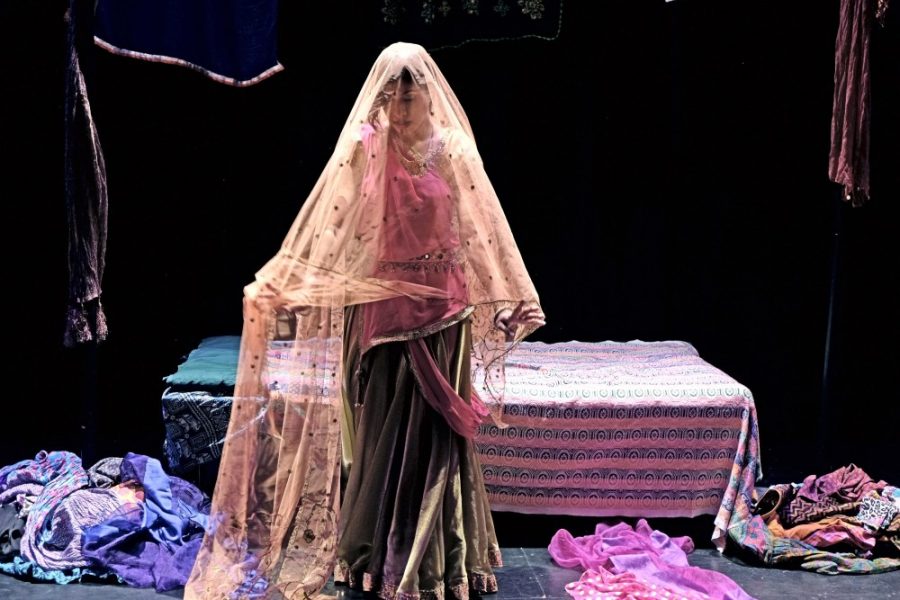Dipti Mehta brought her one-woman show, “Honour: Confessions of a Mumbai Courtesan,” to the Temple of Music and Art on Friday, Nov. 17.
The play was featured as part of a series of events organized by the University of Arizona’s College of Social and Behavioral Sciences. It was designed to bring attention to the issue of women’s empowerment and human rights.
The hour-long show combined humor and drama, giving a profound look into the life of a teenage girl raised in a Mumbai brothel and on the days leading up to her first time selling herself to a customer.
RELATED: UA consortium on gender based violence launches first annual conference
Throughout the play, the various relationships between mother and daughter, pimp and brothel worker, and men and women were presented with a complexity that is sometimes lacking in pop culture’s portrayals of sex work.
“What I wanted to really present to the audiences is the laughter, is the humanity,” Mehta said. “And I’m not saying there’s not tragic consequences … But I wanted to bring the humanity in front of the audiences so that people can look at them as people.”
Mehta was born and raised in Mumbai. To write the show, she did not go back to India. Rather, she relied on her memories of growing up in city where she saw brothel workers every day.
Mehta’s show focuses not on the politics or statistics surrounding sex work, but on the sex workers themselves.
“What I’m talking about is the relationships,” Mehta said. “The relationship between a mother and a daughter is the relationship between a mother and a daughter.”
As a relatively new mother herself, Mehta watched the mother character in the play grow more complex as she drew upon her own experiences.
In addition to being an award-winning actor, Mehta is also a cancer researcher working in New York City. She received her Ph.D. in molecular and cellular biology in 2006 from the University of Arizona.
RELATED: Nasty Women exhibit holds month long show at Bentley’s House of Coffee and Tea
Mehta credits her background in science as being part of the secret to her success in theater.
“Everything that I’ve learned in the lab … I apply to my career as an actor,” Mehta said.
Mehat has performed “Honour: Confessions of a Mumbai Courtesan” in locations across the globe, spreading awareness for the plight of brothel workers. Both people who are familiar with and people who are not familiar with Indian culture come to see the show.
“The response has been phenomenal,” Mehta said. “People who understand the culture, and know the culture, love seeing it. [Other audiences] love it because this is something they have never seen before … And the thing is there is a lot of universal stuff in here.”
Wherever the show goes, Mehta sets up donation boxes for audience members to contribute to after the show. The money goes to various nonprofit groups, such as Apne Aap Women Worldwide, an Indian organization that brings marginalized women into small groups to empower them to fight against sex trafficking.
The show works to empower women wherever they are. Given the recent revelations regarding the exploitation of women by men in power, both in Hollywood and beyond, the issue of how society treats women is particularly relevant.
RELATED: Two UA women hope to inspire others over the internet
“While the play is set in a brothel in India, a world apart from most of our students’ lives, it addresses many universal themes, such as stigmatization, family, hope among sorrow and the ways that women are too often marginalized,” said William Simmons, one of the organizers of the Women’s Empowerment events and a professor at the Department of Gender and Women’s Studies. “And, in this political climate, it is important to embrace stories of resilience and hope, to learn that others less fortunate than ourselves are able to find meaning and even joy in their lives.”
Ultimately, the universality of “Honour: Confessions of a Mumbai Courtesan” allowed the show to deliver its message regarding the humanity of brothel works in a country on the opposite side of the globe from Tucson.
“I think people respond to the heart of the people,” Mehta said. “If you take away the languages we speak, the food we eat, the movies we watch, we are all the same people at the end of the day.”
Follow Vanessa Ontiveros on Twitter














